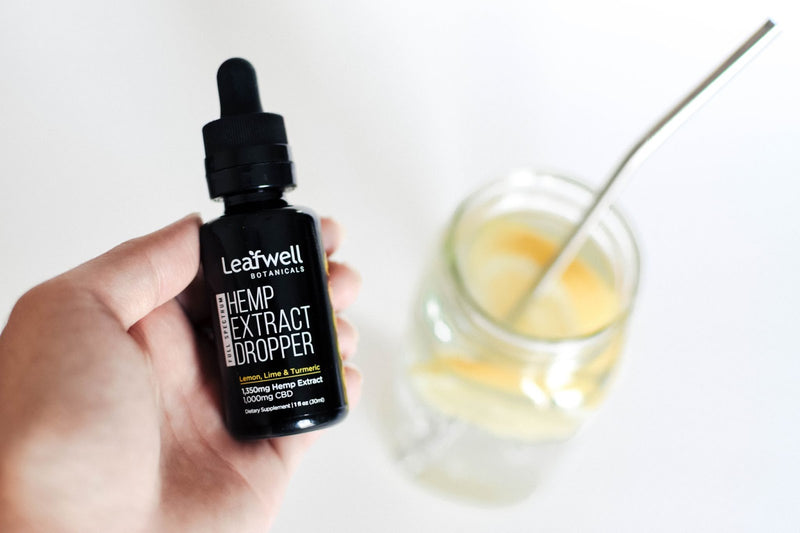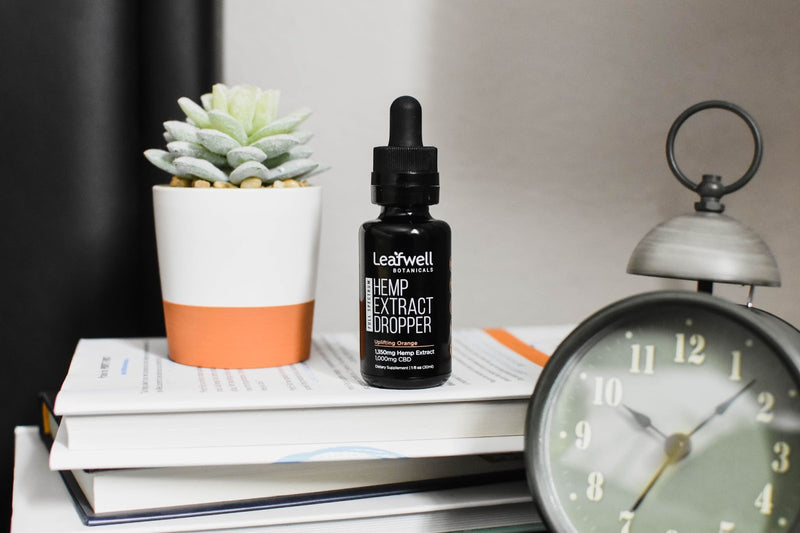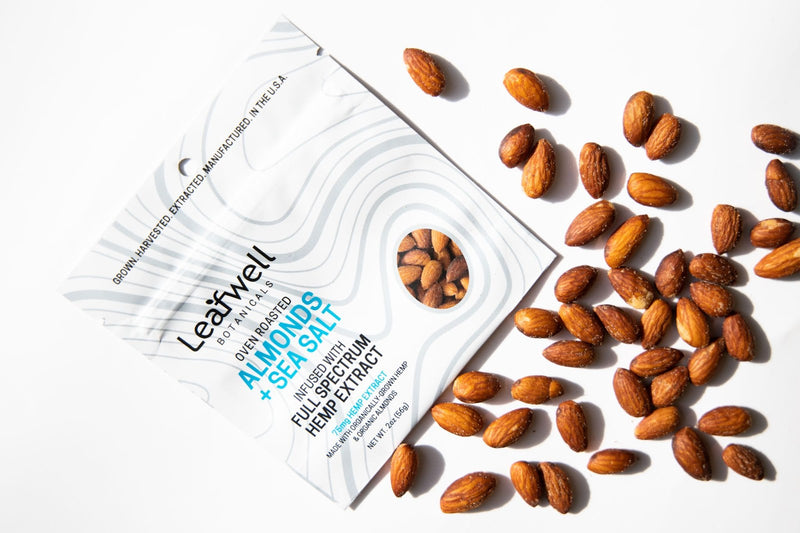Full Spectrum CBD Oil vs CBD Isolate: What’s the Difference?
If you’re new here, you’re probably going to have a few questions about CBD. To someone who has never experienced the benefits of CBD products before, it can be a little confusing figuring out where to start. There are spectrums of CBD which include full-spectrum (contain some THC) and broad-spectrum (non-detectable HC), and there is CBD isolate. For today we will focus on full-spectrum CBD Oil and CBD Isolate. Which one is better (may vary depending on what you need), and more importantly, what do they actually do?
The difference between full-spectrum CBD Oil and CBD isolate in the simplest of terms are the number of cannabinoids, terpenes, and other plant material in each product and the fact that full-spectrum CBD Oil is an oil while CBD isolate is actually a powder. CBD isolate is processed down to be only one molecule, while full-spectrum CBD Oil contains many cannabinoids, terpenes, and plant material.
What is Hemp?
All CBD products are made from hemp. A lot of people get hung up here because many people use the terms cannabis, hemp, and marijuana interchangeably. Aren’t they all the same plant? The answer: From a scientific perspective, yes. But from a legal perspective, unfortunately, no.
Cannabis refers to a family of plants of which both Hemp and marijuana fall under. What makes them different is the legal definition which varies by country but here in the United States it is that any cannabis plant that contains above 0.30% on a dry weight basis is considered marijuana and anything below 0.30% on a dry weight basis is considered hemp. Some countries have a 0.20% limit, while others have a 1.0% limit when it comes to the legal differentiation. All other cannabinoids are irrelevant when considering whether it is hemp or marijuana.
So yes, they are all technically the same plant. Hemp is specifically bred to contain less than 0.30% THC in accordance with the law while containing a variety of other cannabinoids, which include but are not limited to CBD, CBG, CBN, CBC, among others. Hemp has been legal for most of history to grow and use, and it can be used in the manufacturing of textile, rope, skincare products, biofuel, paper, and many other things we depend on in our everyday lives.
CBD and other cannabinoids required to be made from hemp in order to be federally legal. All cannabinoids, including CBD, sourced from marijuana are still federally illegal and are not allowed to be sold across state lines or outside of dispensaries in states where medical and recreational marijuana programs have been put in place.
How is CBD Extracted from Hemp?

CBD oil is almost like the juice of the hemp plant. Like with everything in life, there’s more than one way to extract all the great compounds found in the hemp plant. 99% of manufacturers utilize either CO2 or ethanol as the first step in extracting the CBD and its related compounds from the plant. There are actually several more steps including winterizing, fractional distillation, and chromatography (chromatography is only for broad spectrum) which we speak more to on our science page.
At Leafwell Botanicals, we opted for ethanol’s cryoextraction (very low temperature) for several reasons, which we’ll speak to below.
- Ethanol is extensively used in botanical, medical, and all types of herbal extractions around the world and is the safest method of extraction.
- It’s available in food-grade, organic form which makes it the cleanest solvent available for extraction. You can literally drink the ethanol we use for our extraction, though we would not recommend it!
- We care about the environment. Ethanol is significantly (not even close) more environmentally friendly than CO2 extraction. First off, it is derived agriculturally from plants. It also uses significantly less electricity when compared to CO2 extraction and requires less dewaxing and defatting, aka winterizing, which further increases that gap..
At Leafwell Botanicals we either handle the process in-house or have a direct strategic partnership for every single part of the process from seed to stomach (because we consider you our partners in this as well!). We want to ensure every product meets our high-quality standards and control every ingredient that makes its way into our CBD line. It’s important to us that our CBD is safely and efficiently extracted without harming the environment, being introduced to contaminants, or being exposed to solvents that aren’t recommended for human consumption. To confirm this we send our extracts to be lab tested for potency and over 200 contaminants, including but not limited to heavy metals, pesticides, microbials, mycotoxins, and residual solvents. If you ever have any questions on this, just let us know!
What is Full Spectrum CBD?
Full-spectrum CBD is the result of extracting all the great compounds from the hemp plant, including the THC (though always less than 0.30%). It includes the CBD, other beneficial cannabinoids, terpenes most well known for their smell but also pack health benefits, and other beneficial plant material.
Taking everything from the plant provides you with all the benefits of the plant. This is called the entourage effect. At a high level, the entourage effect is driven by all of the compounds found in the plant having their own benefits but then all working together to have even more benefits (1+1=3).
If you’re not trying to get high or if you live in a state/city where marijuana is illegal, you have nothing to fear with full-spectrum CBD oil. If you are trying to get high, you’re going to have to look elsewhere for now! Haha
The THC levels in full-spectrum CBD oil are low enough that they are extremely unlikely to intoxicate you, especially since the CBD serves as a counter to the THC. Think of the THC in full-spectrum CBD like the alcohol in the vanilla extract you might use to flavor the frosting on your cupcake. It’s a part of the full picture, but a cupcake isn’t going to get you tipsy.
Will Full Spectrum CBD Oil Make Me Fail a Drug Test?
Wait, if full-spectrum CBD oil has THC in it, will it show up on a drug test? This answer is a bit complicated, and any company or person guaranteeing you it won’t is lying, so please be careful. Some companies are adamant that full-spectrum CBD oil will never cause you to fail a drug test, but it’s absolutely possible, and it all depends on the amount of THC in the tincture and how much of it you are taking. Unfortunately there are not extensive studies on what levels cause the THC to flag on a drug test (especially since there are multiple types of drug testing options) but we’ve heard of people failing drug tests with anything above 0.15% THC which they use for a prolonged period of time. If higher % of THC it could happen even quicker. If failing a drug test is a concern for you we recommend speaking with your employer / whoever it is that is drug testing you to confirm you are okay to take a full-spectrum CBD oil. We’re happy to get on a call with you/them if it would help talk through this.
THC is stored in body fat, and it can accumulate even if it never intoxicates you. How much accumulates depends on the concentration of CBD that you take, how frequently you use CBD, and how your body specifically metabolizes it, which can vary slightly from person to person. This is one of the big flaws we see in the regulatory environment right now where it is possible to false-flag a positive THC result even if you never take marijuana. A lot of employers are recognizing this (among other things) and reducing and in some cases eliminating their drug testing requirements as it relates to THC..
You should always check your CBD’s third-party lab report before you use any product to better understand the amount of THC in the product. Just as an example, a THC edible that you buy at a dispensary may contain 5-10mg of THC, while a tincture with 0.30% THC would have ~2.83mg of THC per 1mL, so if you took 1.75mL, you would be consuming roughly the same amount as a low THC edible.
If you have concerns about drug tests and CBD use, speak to your doctor, employer, or whoever else will be administering the test. It helps to be honest about CBD oil use as they may very well be understanding to your situation. Your other option is to use a broad-spectrum or CBD Isolate product that contains non-detectable levels of THC (aka very, very low levels).
What is CBD Isolate?
CBD isolate’s name is pretty self-explanatory. It’s a couple additional steps of extraction where everything except for the CBD is removed which results in a white powder that is the pure CBD molecule. CBD isolate products don’t contain the other beneficial plant compounds and as a result, there aren’t any compounds that can work together to cause the entourage effect typically associated with full-spectrum CBD oil.
Using CBD isolate is certainly more beneficial than foregoing it entirely, but isolate is potentially not going to be as effective for certain things. As an example, low amounts of THC are really great for helping support more restful sleep. If you have concerns about THC, broad-spectrum CBD may be a better option for you to consider. It’s a great compromise that doesn’t sacrifice as many of the benefits.
Broad Spectrum CBD Oil is the Option In Between
Broad-spectrum CBD oil is almost the same thing as full-spectrum CBD with the exception of the THC. Broad-spectrum CBD oil products are designed to have non-detectable levels of THC, although it may not be exactly 0 it is typically less than 0.005%. Always check the lab report! Be aware of lab reports that have Levels of Detectability / Quantification that are above 0.01% as the company may be willfully hiding the amount of THC in the product for CBD Isolate or Broad Spectrum oil products.
If you’re worried about frequent CBD oil use having unintended consequences relating to drug tests, choose a broad spectrum CBD oil product reported at no detectable levels of THC (or less than 0.005%.
Which Is Better: Full Spectrum CBD or CBD Isolate?

Full-spectrum CBD oil will always win out over CBD isolate simply because full-spectrum CBD oil has the most to offer purely from an overall health benefits perspective. If you’re concerned about THC and full spectrum CBD oil is not an option then obviously it loses out! In terms of benefits, it helps to think of full-spectrum CBD oil as a full salad with all the healthy vegetables and CBD isolate as just a bowl of lettuce. They’re both good for you — full-spectrum CBD oil just contains much more beneficial components.
If you’re having a tough time making a binary decision, reach for the broad-spectrum CBD oil. It’s complete enough to provide you with a whole host of wellness benefits while keeping your mind at ease about trace THC. Many people find themselves most comfortable with this option when they’re new to CBD and have to stay away from THC’s. You can always try full-spectrum CBD products once you’re used to incorporating CBD oil into your daily routine and know it’ll be okay with your employer/doctor/anyone who may care.
The Takeaway
As you can see, the difference between CBD Isolate and full-spectrum CBD oil is actually pretty extensive. For CBD to provide the highest level of support, it requires support from its cannabinoid & terpene friends. All of those friends are kicked out of CBD isolate, and as a result, you won’t be able to enjoy everything CBD oil has to offer when you choose a CBD isolate product.
We love full and broad-spectrum CBD oil at Leafwell Botanicals. That’s why we’ve worked so hard to create the very best CBD products to promote your wellness. When you’re ready to experience the benefits of CBD firsthand, choose one of ours. We’ve worked meticulously to craft perfect CBD products in-house, and we stand behind the quality of everything we make. Don’t hesitate to reach out if you ever have any questions!
Sources:
https://www.healthline.com/health/hemp-vs-marijuana







